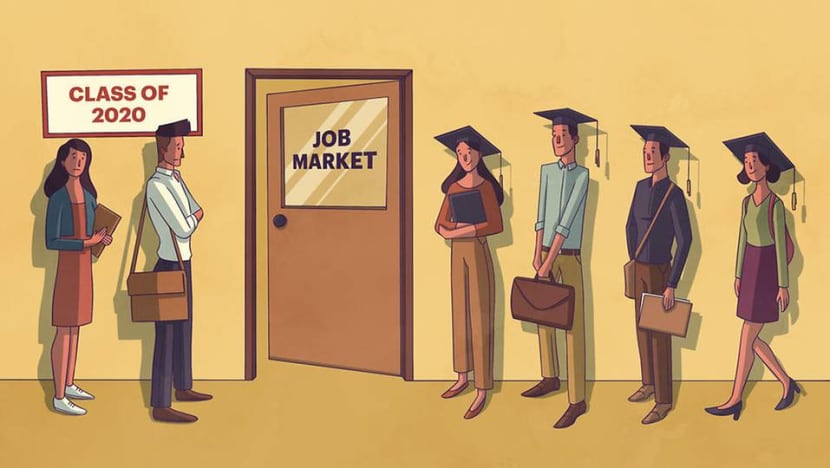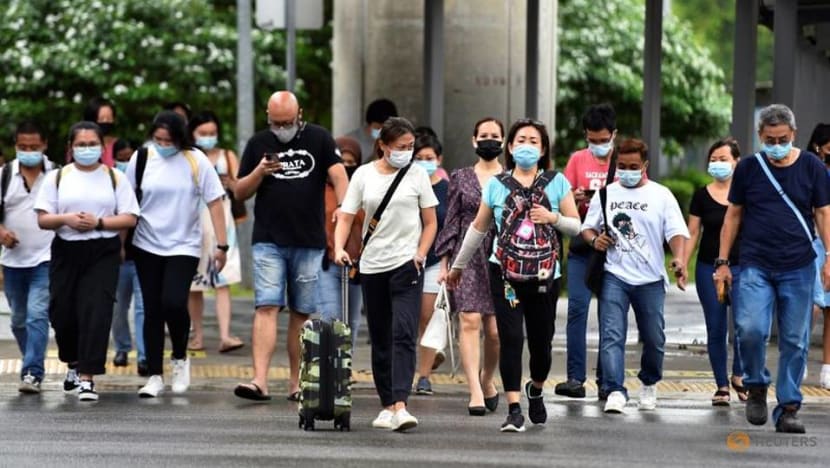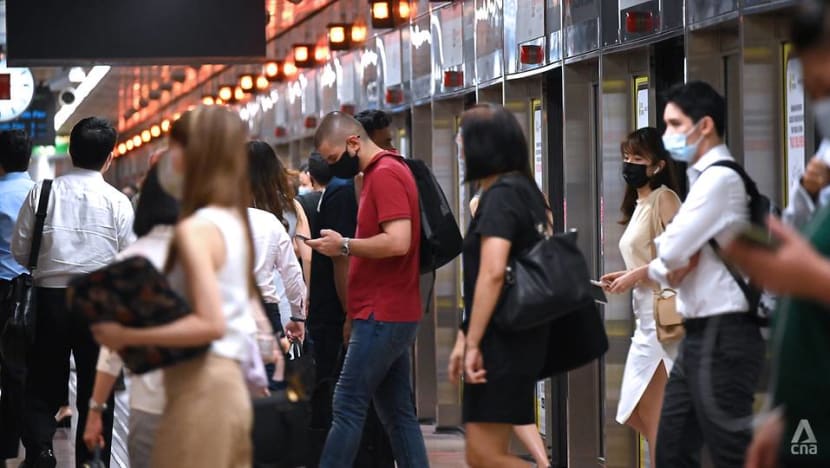The Big Read: In a prolonged crisis, pragmatism rules as recent graduates put dreams on hold
The story of broken dreams and difficult job search is not uncommon among young jobseekers as Singapore’s economy tries to chart its path in a pandemic-forced new normal.

According to the Ministry of Manpower’s latest labour market report for the first quarter of this year, the youth unemployment rate was 10.6 per cent in 2020, when Singapore experienced its worst recession since its independence in 1965. (Illustration: TODAY/Anam Musta’ein)
SINGAPORE: Eager to carve a career in the performing arts, Ms Lili Muslihah had ended her stint with a theatre company in February last year to go freelance — a common route for many in the industry.
But the 27-year-old’s dreams came crashing down after the COVID-19 virus began to spread its tentacles here, infecting hundreds and then thousands, and causing havoc to the Singapore economy, as elsewhere around the world.
“Right after I resigned, the whole situation just unravelled, all the (performing arts) events were cancelled,” said Ms Lili, who graduated from the Royal Central School of Speech and Drama at the University of London with a degree in theatre practice in December 2019.
READ: Employment grows more than expected in Q1, but uncertainties weigh on recovery: MOM
She began looking for odd jobs to help sustain her income, and eventually took up a gig as a food delivery rider during the two-month circuit breaker period, which began in early April last year.
At the time, she still hoped to return to the performing arts scene when things improved.
But weeks turned into months, and before she knew it, she had been delivering food for 10 months.
Pursuing a performing arts career in Singapore is challenging enough in normal times. What more during what has been dubbed a once-in-a-generation crisis?
Amid the long drawn-out pandemic, the realisation eventually hit Ms Lili, who began to look for a job outside the industry in January, applying for over 100 job openings on various career portals.
“I applied for jobs in healthcare, corporate, even government positions … whatever I saw, I just tried.” But she hardly got any responses.
READ: Singapore's sharpest fall in employment in more than 20 years borne by non-resident workers: MOM

It was only in May when she finally received an offer from an industry she had never expected to be in — education. She now teaches English part-time at a tuition centre, earning about S$1,000 a month.
Ms Lili’s story of broken dreams and difficult job search is not uncommon among young jobseekers as Singapore’s economy tries to chart its path in a pandemic-forced new normal.
According to the Ministry of Manpower’s (MOM) latest labour market report for the first quarter of this year, the youth unemployment rate was 10.6 per cent in 2020, when Singapore experienced its worst recession since its independence in 1965.
The figure is higher compared with previous economic downturns — 8.8 per cent during the 2009 Global Financial Crisis, and 9.3 per cent during the 2003 severe acute respiratory syndrome (SARS) pandemic.
READ: Retrenchments and withdrawn job offers: Singapore's labour market shows signs of COVID-19 strain
READ: Commentary: The fear of failure cannot help Singapore reach our best
Economists said that while the unemployment numbers during last year’s recession seemed only slightly higher than the previous downturns, this was partly because many youths had taken on temporary positions, many of which were created under government-initiated schemes, such as the SGUnited Traineeships Programme.
MOM said that four in 10 youths in employment were in temporary or contract jobs, and were mostly students who were working on the side. A youth is defined by the ministry as a person aged 15 to 24.
Interviews with those in the age group as well as recent graduates aged slightly older found that the latter are in a similar predicament.
Like Ms Lili, many of those interviewed had struggled to look for employment. And even though the economy and job market are expected to recover this year, jobseekers from the class of 2020 now find themselves having to compete with the graduating cohort this year.
Nevertheless, some of those who graduated last year said they were grateful for the traineeship programmes that had been offered to them, since these allowed them to upskill and in some cases, even led to conversion to full-time roles.
“In previous recessions, we didn't have the SGUnited Traineeships Programme, and the unemployment rate stood at 9-odd per cent,” said DBS Bank senior economist Irvin Seah.
“(Now) even with the traineeship programme and employment-focused policy measures, the unemployment rate has still hit 10 per cent.
“It would have been a lot worse compared to previous crises ... (the youth unemployment rate) is only marginally higher now that we have these government measures,” he said.

TRAINEESHIP WOES AND TRIUMPHS
A graduate who wanted to be known only as Walter had been taking on performing arts roles on a freelance basis, such as providing support at live performances. But like Ms Lili, his lifeline was cut when the industry ground to a halt due to COVID-19.
The 28-year-old graduated from a local university in 2019 with a degree in the arts, and had to work as a food delivery rider during the circuit breaker period. He searched for opportunities at the same time, and found a traineeship with a tech start-up under the SGUnited Traineeships Programme.
READ: Middle-aged workers harder hit by COVID-19 downturn, economists suggest tracking 'vulnerable' group closely
READ: Commentary: What graduating jobseekers need to know – four recession-proof strategies
The government-funded programme — part of a slew of measures to cushion the pandemic’s impact on the job market — is meant to help fresh graduates develop industry-relevant skills, and they also receive a monthly training allowance.
Walter’s traineeship started in October, and he was tasked with marketing the company’s products, which included managing its social media presence. This was a “360-degree turn” from the industry he had set his sights on before the pandemic.
While he knew that some traineeships had a structured programme where trainees were attached to a mentor, Walter said that his company had no such structure. He was “thrown into the deep end”, as it was a new role created just for him.
“What I’m surmising is that the firm decided to take full advantage of the programme and tried to open up a position and see if anything comes out of it,” he said. While the programme is a 12-month stint, he has no intention to convert full-time, even if offered.
Walter did not want to reveal his real name as he has not told his employer about his plans to leave the firm.
Ms Lili said that in her job search, she did not consider applying for traineeships, due to the prevailing sentiment among her peers that trainees would do full-time work but be paid lower than market rates.
But there are others who have reaped the benefits of the traineeships.
Mr Andrew Lee, who was featured last year as part of Big Read on the national traineeship programme, had worked for almost a year in his traineeship at logistics and warehousing firm Yang Kee Logistics when he received the good news — that he would be converted to a full-time software developer executive.
“My (initial) thoughts were that software development will be stressful and very fast-paced and I would not have any work-life balance,” the 24-year-old said.
But his traineeship at the firm has proven otherwise. “I’m quite happy as I’m quite comfortable here, and it isn’t so stressful,” Mr Lee said.
READ: IN FOCUS: Graduating into a COVID-19 jobs market - short-term challenges and longer-term issues?
The polytechnic graduate, who had served National Service before embarking on the traineeship last year, said that he had decided even before graduation that he wanted to do software development, but was not sure which industry to enter.
“For coding, I could go anywhere, so I did not have a specific industry in mind such as banking or logistics, I felt like anything would do,” he said. “During this time, you can’t be picky.”

In response to queries, Workforce Singapore (WSG) said that as of April, about 9,200 had joined the SGUnited Traineeships Programme, and that most of these traineeships are still ongoing.
Of the figure, over 680 graduates had been offered full-time conversions with their host organisations, or had found full-time employment elsewhere.
“We expect more fresh graduates to come onboard the programme after the 2021 cohort graduates progressively from the various Institutes of Higher Learning this year,” WSG said.
For participants in the programme who have not secured full-time employment, WSG said it has been engaging with them to support their job search.
“Experience gained from these contract work and traineeships will add to their resume and allow them to build meaningful experience and useful networks which can open doors to potential new careers,” WSG said.
READ: Commentary: Here’s what Singapore’s human capital index in a world of disruption should look like
ENTERING A CRISIS-HIT WORKING WORLD
As the economic outlook remains murky, and with the pandemic forcing many companies to rethink their business models — all of which will have an impact in terms of jobs availability and salaries offered — some fresh graduates from this year’s cohort have had to go back to the drawing board when it comes to their job search.
For Mr Muhd Izzdanial, he had found a liking for nature during a final semester internship in the first half of this year with the National Parks Board (NParks).
During the internship, the Nanyang Technological University (NTU) biological sciences graduate was tasked to organise workshops for youths interested in the biodiversity here, heading out on field trips to nature parks around Singapore.
READ: Commentary: What a lousy time to graduate, what an unfair handicap for graduating students
The 24-year-old also volunteered at butterfly-watching events organised by NParks, among other responsibilities.
“During this job, I began to know more about animals in Singapore and I can name most of them,” he said.
A full-time stint with NParks is one of about 40 job openings that he has applied for since he started his job search this month.
Mr Izzdanial is also open to other industries, such as data engineering or as a laboratory scientist, both of which are more related to his degree.
“(I’m willing to work in) whatever industry to get through this and earn a salary, until I find a better suited role,” he said.
He said his ideal job would involve nature advocacy — teaching members of the public about the biodiversity here.
Apart from getting a job, some fresh graduates are also concerned whether employers will lowball them and “take advantage” of the pandemic to get a good deal.
READ: How heartland shops got a chance to work with big Swedish firms like H&M and Anticimex
Melissa (not her real name), who graduated in May with a finance degree from a local university, had initially hoped to be recruited for a data analyst role in the finance industry.
However, the 22-year-old was unable to get her desired job despite making more than 400 applications in the months before she graduated.
She suffers from one disadvantage: She lacks the experience that graduates from the past year’s batch, all vying for the same jobs, have.
“Last year, there were also traineeships, so we are also competing with (last year’s graduates) for full-time roles,” she said.
Instead, Melissa found a data analyst role in a different industry. As she was not familiar with the industry, she had quoted a low starting salary, which the firm accepted.
“I then realised what the industry value (for starting salaries) was, but they were not willing to change the terms.”
At the same time, Melissa was accepted into a part-time Masters programme in analytics at another local university, which she decided to pursue in the hope the pandemic would be over by the time she completed her studies.
Upon accepting the offer, she quit her job at the firm early this month (June), after working for only one day, as she “didn’t want to waste the company’s time”.
She did not want to give her real name, nor reveal the industry she had briefly joined, as she did not want to be identified by her former employer.
“I think it is an ethical issue, if it’s a pandemic and we give in and accept a lower pay, when the pandemic is over, the company will tag their salary to your previous salary, and employers won’t understand that your pay was lower because of the pandemic,” Melissa said.
READ: Challenging job-hunting landscape as recruitment agencies see fewer vacancies and more applications
Indeed, a study by the National Bureau of Economic Research in the United States published last year shows that cohorts that had graduated during the period of economic weakness following the Global Financial Crisis in 2009 had weaker earning trajectories compared to cohorts that entered the job market earlier.
It was also found that these cohorts, which face high unemployment during graduation, tend to show lower employment rates throughout their careers.
Local universities said that they have a slew of support measures to help fresh graduates find employment.
For example, a National University of Singapore (NUS) spokesman said that the NUS Centre for Future-ready Graduates has several initiatives to help recent graduates, including job search support through virtual networking events with potential employers, and career advisors whom students can consult.
NUS will also offer four free continuing education and training (CET) modules to the Class of 2020 and Class of 2021 graduates until March 31 next year.
Similarly, NTU alumni who graduated last year will receive an additional S$1,600 in alumni credits for CET courses, on top of the existing S$1,600 available to all alumni.
Singapore Management University’s director of the Dato’ Kho Hui Meng Career Centre Sim Cher Young said that the career centre has been providing clinics to graduating students to help them “fine tune their employability skills in time for the applications season and soon after with interviews”.
The centre also offers support for alumni up to three years after they graduate.

ADVICE FROM HR EXPERTS
Given that the pandemic has now affected a second batch of graduates, it is up to those who graduated earlier but have still not secured full-time employment to find ways to stand out from the crowd, human resource (HR) experts said.
Mr Adrian Choo, founder of career consulting company Career Agility International, said that it is important for job-seeking graduates to learn more about the industries that they are interested in.
“Be proactive, reach out to talk to people (in the industries), talk to target companies, there’s also always online courses,” he said.
READ: 2,800 job seekers placed in traineeship and company attachments under SGUnited Jobs and Skills programmes
He added that unless a person has studied in a specialised field, such as in a pilot school or medicine, what graduates study in universities typically has “low relevance” to the industry which they enter eventually.
“Employers want to see the potential, the promise, and in the long run, they want people who can bring potential to the company,” he said. “You have to show me that you have been learning, that you are capable of performing.”
Agreeing, veteran HR practitioner Adrian Tan said that one advice he would give to recently graduated jobseekers is to look for job listings in their desired industries, and look for what skills employers are looking for in those roles.
“Look at the gap between the job posting and yourself. And ask yourself, for this gap, how to acquire the experience?
“And if in future an interview does materialise, you can easily tell people ‘Oh, I got this skill set from Coursera, related to project management’, for example,” said Mr Tan.
READ: Commentary: Career Mobility is the new Career Stability
READ: Commentary: Want your dream job? Here are the career milestones to hit at every age
Veteran HR practitioner Carmen Wee said that graduates during this period should not fixate on their “dream” industries if these have been impacted by the pandemic. Instead, they should be flexible and look for opportunities in adjacent fields.
“Those in aviation, tourism, hospitality ... they may need to find adjacent skills, move into industries that make use of their skills,” said Ms Wee.
For example, those in the hospitality industry could find work in other industries such as the food and beverage sector which are looking for people with customer service skills.
She added that fresh graduates should take up whatever jobs they can during this period to gain some base experience, as they may not have much leverage over prospective employers as they still lack the skills.
“If these graduates have the skills the market really wants, they would be snapped up by now,” Ms Wee said. “Even if it’s a junior position, you need to start from somewhere.”
Mr Tan added that experience can come in many forms, and need not be tagged to an institution.
For example, a mass communications graduate could start a YouTube channel while searching for a job, and gain experience in how to edit videos and create content.
“When an employer asks for your portfolio, you can say ‘yes, here are these videos that I made on YouTube’,” he said.
As for those who are considering going into the gig economy as food delivery riders, Mr Tan said that it is a good way to earn income — but only out of necessity.
Graduates should remember to juggle this part-time work and upgrade their career-relevant skills at the same time.
“You just want to build a runway (because) you still need time to practise your craft,” said Mr Tan.
With many people — including recent graduates — turning to working as food delivery riders to make ends meet as employment opportunities dry up, food delivery companies reiterated that they have been providing upskilling opportunities to fresh graduates who have come onboard their platforms.
A Foodpanda spokesperson said that while the company does not keep track of the number of fresh graduates among its delivery riders, the percentage of riders between the ages of 18 and 24 is around 10 to 15 per cent.
The spokesperson said that it has partnered with various organisations, including SkillsFuture, to develop and offer learning content for its riders, including courses in financial literacy.
The other major food delivery firms — Deliveroo and Grab — were also unable to provide figures for fresh graduates working with them.
READ: Commentary: Hire an arts graduate to formulate business strategy. Why not?
A Grab spokesperson said that it has partnered with Microsoft and Temasek Polytechnic as part of the SGUnited Skills programme for an eight-month training programme for individuals who are interested in software development roles, among other opportunities.
Deliveroo has partnered with OpenClassrooms, an online education platform for vocational training, to provide free online learning for riders in Singapore and globally across a range of different subjects, including help to start-up businesses, soft skills training and web design courses.
CHALLENGE FOR POLICYMAKERS
When it comes to youth unemployment, a key indicator that the economy is out of the woods is when it is able to create permanent jobs, said Mr Seah, the DBS Bank senior economist.
“Today, many of those jobs created for fresh grads are actually temp positions, not permanent roles and henceforth there is less job security.
“The key question is how are we able to create more permanent roles, and that is the biggest challenge for policymakers today,” he said.
The long-term unemployment rate here — which refers to those unemployed for at least 25 weeks — among the youths was 1.1 per cent in 2020, comparable to the overall average of 1 per cent, and during the SARS pandemic (1.3 per cent) and the Global Financial Crisis (1 per cent).
It is also one of the lowest when compared against other economies such as France (8.4 per cent), the United Kingdom (4 per cent) and Hong Kong (3.8 per cent).
OCBC Bank head of treasury research and strategy Selena Ling said that while the youth employment situation is far from ideal, the job environment is improving “slightly” amid a broader economic recovery.
The Government expects full-year economic growth to reach 4 to 6 per cent this year. A recent survey of private sector economists by the Monetary Authority of Singapore projects an expansion beyond the range at 6.5 per cent.
Ms Ling said: “(Employers and consumers) are more confident of the recovery story, as vaccines are underway and people can look ahead … if the consumers are willing to spend, then businesses will be more confident to expand their operations.”
Agreeing, Mr Seah said that it is thus important for Singapore to normalise its economic activities.
“If the engines of the economy start to create more permanent jobs, then we will be able to absorb the slack in the labour market.”

Should the economy fail to provide permanent roles for youths, long-term consequences can arise, as observed in other economies with high youth unemployment.
During the debt crisis in Europe that began in 2008, for example, thousands of youths in the region were left without jobs.
“Youth unemployment spiked up to 40 per cent (then) in some countries,” said Mr Seah. “It became a social problem, there was more violence and more crimes … It was short of saying that there was a lost generation.”
For Ms Lili and Walter, the lessons that they have taken away from the pandemic have made them stronger, and determined to let go of old dreams and venture into new industries.
“I have gotten a lot more resilient, especially over the course of the past year,” said Walter. “I think the turning point was realising that it is ok to not be in an industry that I was prepared for from my undergrad days.”
After his traineeship ends in October, Walter plans to take up courses in counselling, as he intends to eventually set up a venture or initiative to help counsel individuals in the arts scene. The industry does not receive enough support on the mental health front, he said.
READ: Commentary: Workers appreciate mental health days off after a crazy pandemic year
“Taking space outside of this industry I love so much has given me both hard and soft skills that will be useful, if and when I do choose to come back,” Walter added.
For Ms Lili, she plans to return to schools to teach dance classes, something she had been doing before the pandemic, when co-curricular activities are allowed to resume.
“I feel that all these hardships in looking for a stable job has built me up as a person, as I also have to keep encouraging myself to push on whenever I hit a bump on the road,” she said. “It’s part of moving on with life and adapting to new changes.”
BOOKMARK THIS: Our comprehensive coverage of the coronavirus outbreak and its developments
Download our app or subscribe to our Telegram channel for the latest updates on the coronavirus outbreak: https://cna.asia/telegram
For more news like this, visit todayonline.com










